Mark Billington: 'We're determined to find out who killed our son'
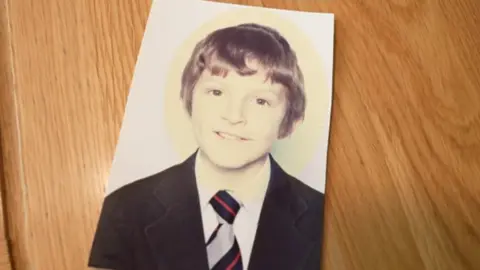 BBC
BBCOn 1 September 1984, 15-year-old Mark Billington rode out on his bike to fly a kite near his Birmingham home. It was the last time he was seen alive, his body found hanged from a tree weeks later.
Initially treated as a suicide, years later it became a murder inquiry. But, despite a decades-long investigation, no-one has ever been charged. After almost 38 years without knowing who was responsible, the family have begun their own appeal for information in a bid to find his killer.
Roy and Winifred Billington adopted Mark as a baby and Mrs Billington's memories of the day he arrived remain as vivid as ever.
"He sat there and he looked around the room and I put my hands out to him and he put his hands out - he was mine," she said.
"I was adopted, so he always knew he was adopted, I always used to say we were special because we were chosen.
"And for this to happen to a child... he was the last person you would ever imagine it would happen to."
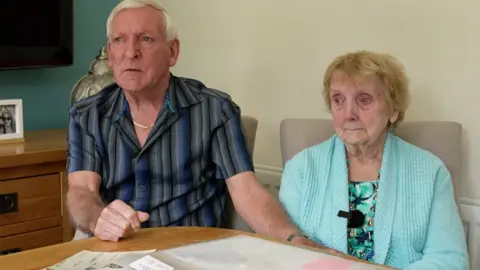
Mark was a gentle boy - sensitive, quiet and happy. He loved animals and cooking, and shied away from violence. He tried judo classes, but it wasn't for him.
He also had a developmental delay, a mental disability and a weakness on one side of his body.
He managed a paper round though, and people would tell his parents how he would pick up fish and chips or groceries for them while doing his deliveries.
Mark was last seen by his family at their home in south Yardley, Birmingham. Mr Billington was heading out to return a pair of his daughter's ballet shoes, while Mrs Billington took the two younger children, Cheryl, then seven, and Phillip, nine, into town.
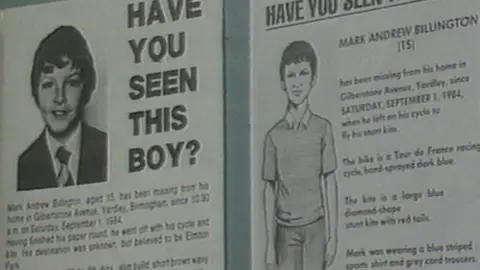
Mark was sitting on the doorstep having completed his morning paper round and decided not to join them.
When the newsagent rang to say he had not turned up for his paper round at 17:00, something Mark never missed, Mr Billington said "alarm bells" started to ring.
When they found his bike and kite missing from the garden shed, the family called police and endured a "manic" nine-week search for Mark.
It wasn't until 11 November, while visiting Mrs Billington's mother for her birthday, that the police rang.
Mr Billington remembered falling to his knees as he was told his son's body had been found hanging in a tree on the edge of Meriden, near Coventry, seven miles (11km) from his home.
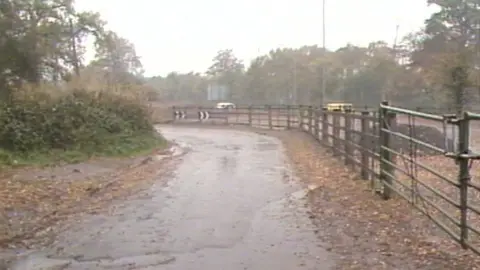
As soon as they arrived at the police station to identify his clothes, Mr and Mrs Billington said they had been met by an officer who said Mark's death was a suicide.
But they never believed he had killed himself.
When his parents learnt the details of how his body was discovered, they were further convinced he couldn't have taken his own life.
They did not believe, with his developmental delay, he would be able to tie a complicated knot. And he could not possibly have ridden his bike out to the woodland where he was found, they said.
An inquest into his death later recorded an open verdict, but Mr and Mrs Billington said they did not think the police investigation had been handled correctly.
"They decided when he was hanging in the tree, they decided then that it was suicide so we didn't get fair treatment," Mrs Billington said.
"We believed everything we were told, we are old school.... the police are up there, you're down there - if you want help, you go to the police."
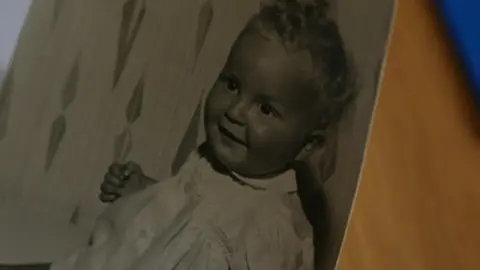
While grieving and dealing with the investigation, she said they had faced "horrendous" attention from the press and had been forced to send their two younger children to stay with friends to keep them safe.
The Billingtons' daughter Cheryl Jeyes, now a mother-of-three herself, also remembers that time and said she had thought the longer she stayed away that "Mark would come back".
"I remember seeing Mum and Dad on the telly and that is difficult because obviously I could see they were sad," she said.
The impacts of the case were felt throughout their lives, and Mrs Billington feared letting her two other children out to play.
They also faced further tragedy eight years later when eldest son Russell died in a motorcycle accident.
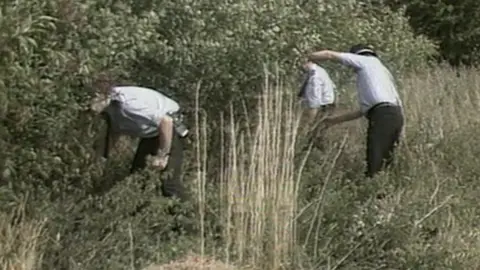
It was not until 18 years after Mark's death, in 2002, that West Midlands Police announced it had become a murder inquiry after "significant" new information prompted a "full-scale reopening" of the case.
Mr Billington said they felt this "dictated the case had been mishandled to start with".
"It couldn't bring Mark back obviously but at least we had some sort of resolution from that point of view," he added.
Police started re-examining Mark's death in 2001, following the jailing of killer Brian Field.
Field, then 65, a farm labourer from Solihull, was jailed for life at the Old Bailey after pleading guilty to the murder of Surrey teenager Roy Tutill, 14, in 1968.
The conviction led to police looking at several unsolved murder cases to see if they were connected to Field.
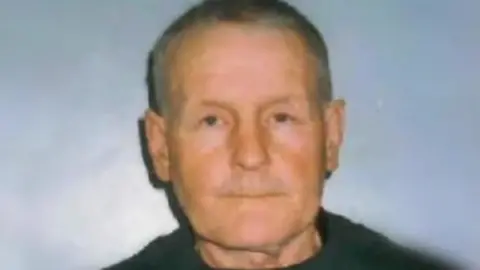 Police
PoliceBut when the murder inquiry was publicised, it stressed Field had not been interviewed regarding Mark's death.
Instead, detectives were focusing the investigation on a group of teenagers seen in a park behind Mark's house as he flew his kite.
They were also seen later outside a building society, while Mark was inside.
Despite several arrests, 20 years after the murder investigation began, there have never been any charges over Mark's death and the family remain without answers.
"Growing up....finding out what happened to Mark, you live with the fear of 'is that person still out there?'," Mrs Jeyes said.
"I can't put it into words how you carry that with you all the days of your life."
They have now launched their own campaign to try to find out who was responsible, urging members of the public to help them via a Facebook page.
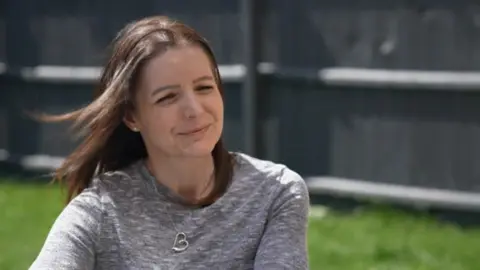
At her home, Mrs Jeyes has folders of documents covering the case from the beginning and containing information brought forward by people in recent years.
A team of volunteer investigators have helped launch the page, and have taken on Mark's case, "working in the background to find clues or any information".
Describing it as like a "jigsaw with a few pieces missing", they said even the tiniest piece of information could potentially aid them in putting together a picture of what had happened to Mark and want to hear from anyone who has memories of that time.
"I plead with anybody in their hearts, especially if you have got family, imagine trying to live with this all your lives and seeing your parents' agony," said Mrs Jeyes.
"Please if you know anything, just get in touch."
Last year, a Channel 4 documentary highlighted the possible connection between Field and Mark's case, as well as in the case of two boys David Spencer and Patrick Warren, 11 and 13, who vanished from Chelmsley Wood in Birmingham on Boxing Day in 1996 and whose bodies have never been found.
The Billington family said they still believed Field was a "good suspect", with him known to have lived "10 minutes' walk, quarter of an hour at most" away from where Mark was last seen, and had been released from prison in the months before his disappearance.
They also hope to hear from anyone who knew Field when he was living in Birmingham before 1988.
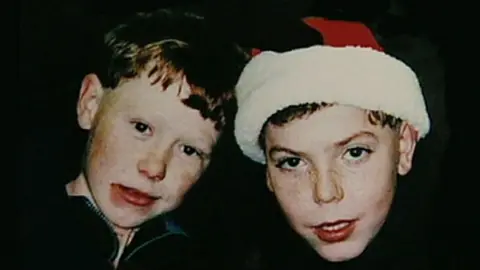 West Midlands Police
West Midlands PoliceMr Billington said the family had been told by police Field had been living in Oswestry, Shropshire, at the time of Mark's disappearance, about 90 minutes' drive away, and questions remained "unanswered".
"I may be entirely wrong but he was, as far as I am concerned, a prime suspect for it," he said.
When West Midlands Police was asked whether Field had been spoken to in connection with Mark's case, it said: "It would be wrong to name people who may or may not have helped with our past investigations, or who may or may not be able to help us with future investigations."
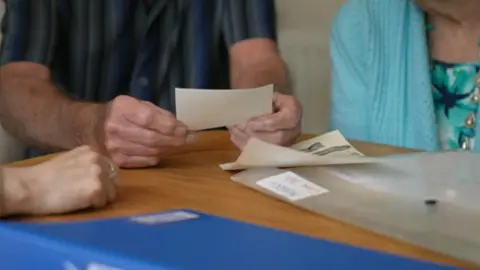
Mrs Jeyes said the family had recently put forward a number of questions to the force about Mark's case, and had not had responses to some, including what policies were in place dictating how long evidence should have been kept.
The force told the BBC that, as Mark's death had originally been investigated as suicide and the case passed to the coroner, rules at the time meant it was not required to keep items which may now be considered as evidence.
It said Mark's case had last been reviewed in 2021.
Det Supt Shaun Edwards, from West Midlands Police, added: "Almost 38 years after Mark's death and his family and friends have not had the closure they need.
"Our focus remains on justice for Mark and our thoughts are with his family and friends who will never forget him.
"As with all unsolved crimes, we remain ready to follow up any new information."
Mark's mother said the family still had "hope" of finding those responsible for his murder.
"I would like to give Mark the justice he deserves and that would be to find whoever did it."

Follow BBC West Midlands on Facebook, Twitter and Instagram. Send your story ideas to: [email protected]
